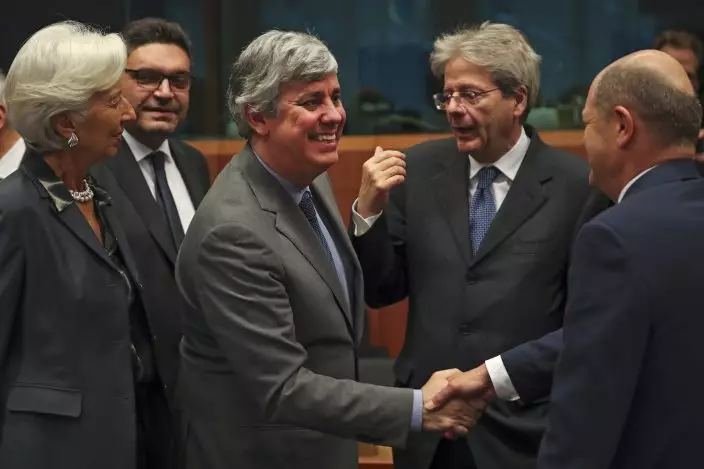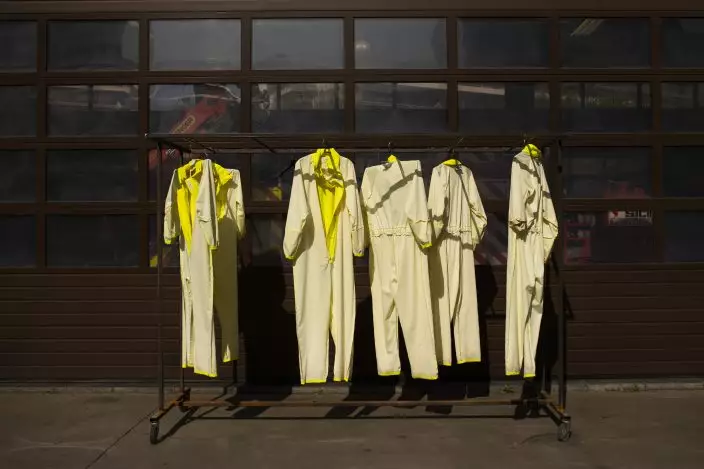The European Union moved Wednesday to head off a chaotic and potentially disastrous easing of restrictions that are limiting the spread of the coronavirus, warning its 27 nations to move very cautiously as they return to normal life and base their actions on scientific advice.
With Austria, the Czech Republic and Denmark already lifting some lockdown measures, the EU’s executive arm, the European Commission, was rushing out its roadmap for members of the world’s biggest trade bloc to coordinate an exit from the lockdowns, which they expect should take several months.
Some 80,000 people have now died in Europe from the disease — about two-thirds of the global toll — according to the European Centre for Disease Prevention and Control. The commission said those scientists should be relied upon to guide national exit strategies in the weeks and months to come.

FILE - In this Monday, Jan. 20, 2020 file photo Eurogroup President Mario Centeno, center, shakes hands with German Finance Minister Olaf Scholz, right, next to European Central Bank President Christine Lagarde, left, Cyprus' Economy Minister Constantinos Petrides, second left, and European Commissioner for Economy Paolo Gentiloni, second right, during a meeting of European Union Finance Ministers in Eurogroup format at the Europa building in Brussels. Governments from the 19 countries that use the euro overcame sharp differences to agree Thursday on measures that could provide more than a half-trillion euros ($550 billion) for companies, workers and health systems to cushion the economic impact of the virus outbreak. Mario Centeno, who heads the finance ministers' group from euro countries, called the package of measures agreed upon "totally unprecedented... Tonight Europe has shown it can deliver when the will is there." (AP PhotoFrancisco Seco, File)
Brussels is deeply concerned about the damage that could be done if each EU nation charts its own course, given the panic that reined after the pandemic first spread in Italy, with unannounced border closures that sparked massive traffic jams and export bans that deprived hard-hit countries of medical equipment.
And the EU is very much split in its approach. France this week renewed its locksown until May 11, and Belgium appears headed in a similar direction. Spain also recently renewed its state of emergency for the second time for an additional two weeks.
In a draft of its roadmap, seen by The Associated Press, the EU commission says easing restrictions will “unavoidably lead to a corresponding increase in new cases.” It warns that this should only happen when the spread of the disease has dropped for some time and when hospitals can cope with more patients.

Protective suits hung after being disinfected at the firefighters headquarters in Brussels, Thursday, April 9, 2020. The new coronavirus causes mild or moderate symptoms for most people, but for some, especially older adults and people with existing health problems, it can cause more severe illness or death. (AP PhotoFrancisco Seco)
While the commission, which proposes EU laws and ensures that they are enforced, does not spell out exactly how EU countries should make the transition, it does underline that “the exit should be gradual.”
Business operations should be phased in by sectors, based on things like how much can be done over the internet, the economic importance of the industry, or the kinds of shift work that could be introduced. Social distancing should be maintained and there should be no general return to work, it says.
Shops could gradually reopen, with possible limits on the number of people who could enter, and school could start again, although the commission recommends smaller classes to allow students to work at a safer distance from each other.
Brussels says a gap of around one month should be left between any steps “as their effect can only be measured over time.”
Follow AP coverage of the pandemic at http://apnews.com/VirusOutbreak and https://apnews.com/UnderstandingtheOutbreak


